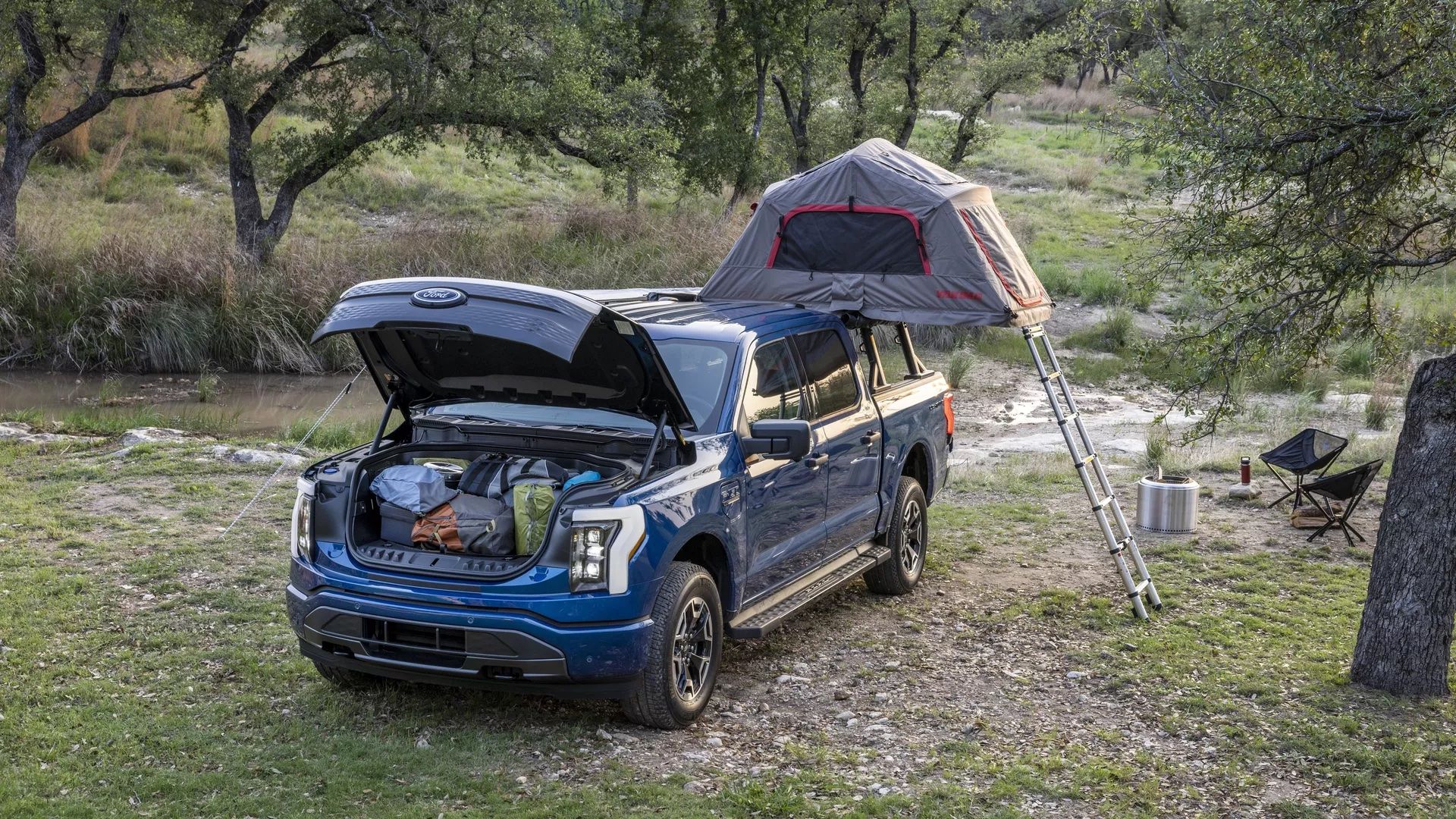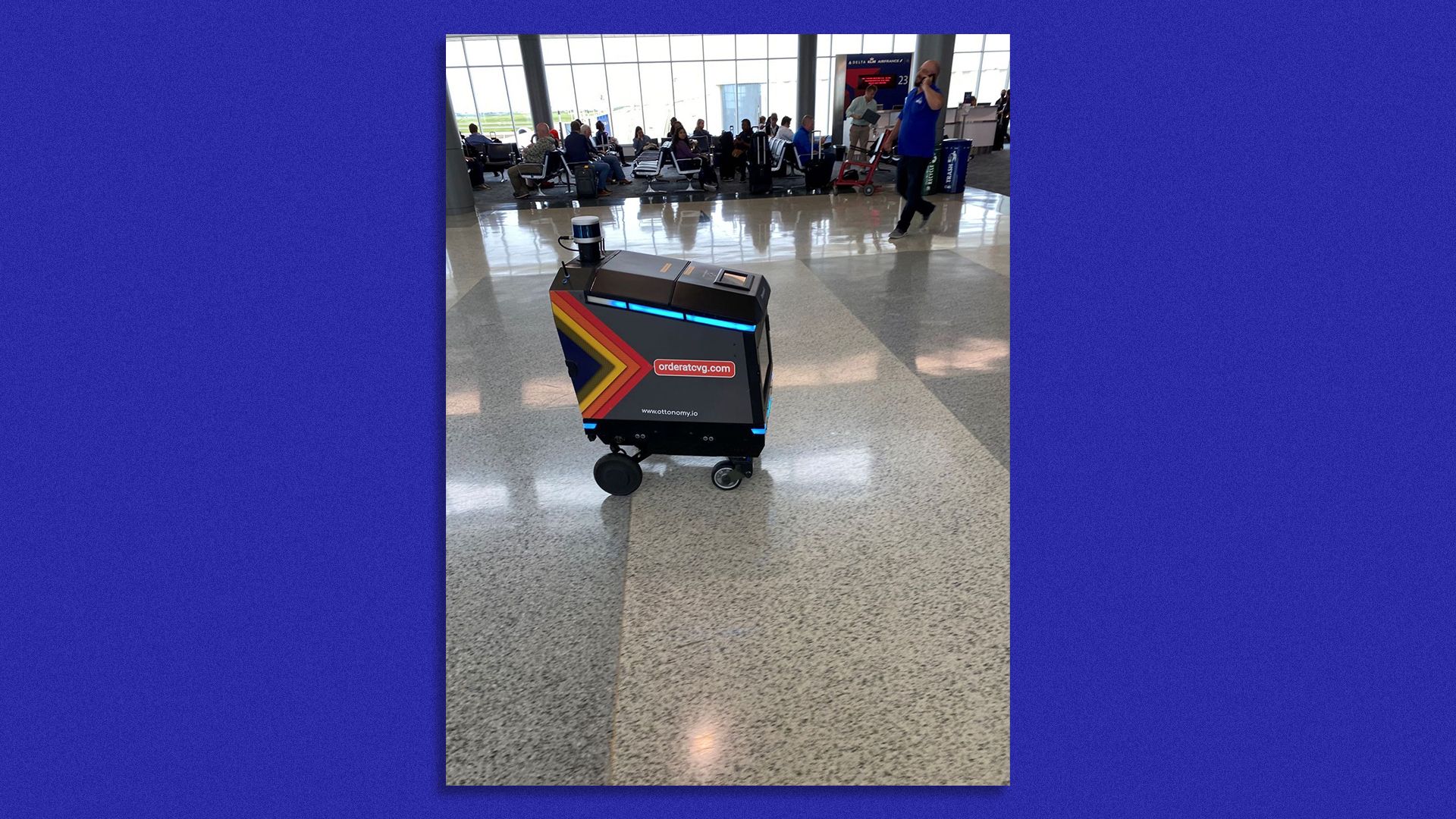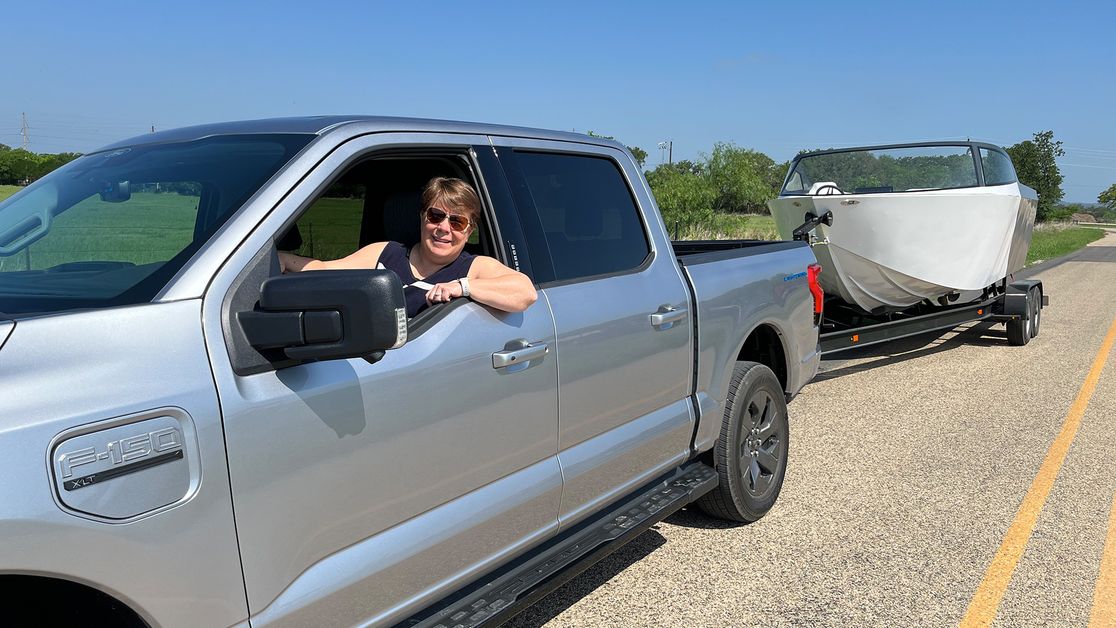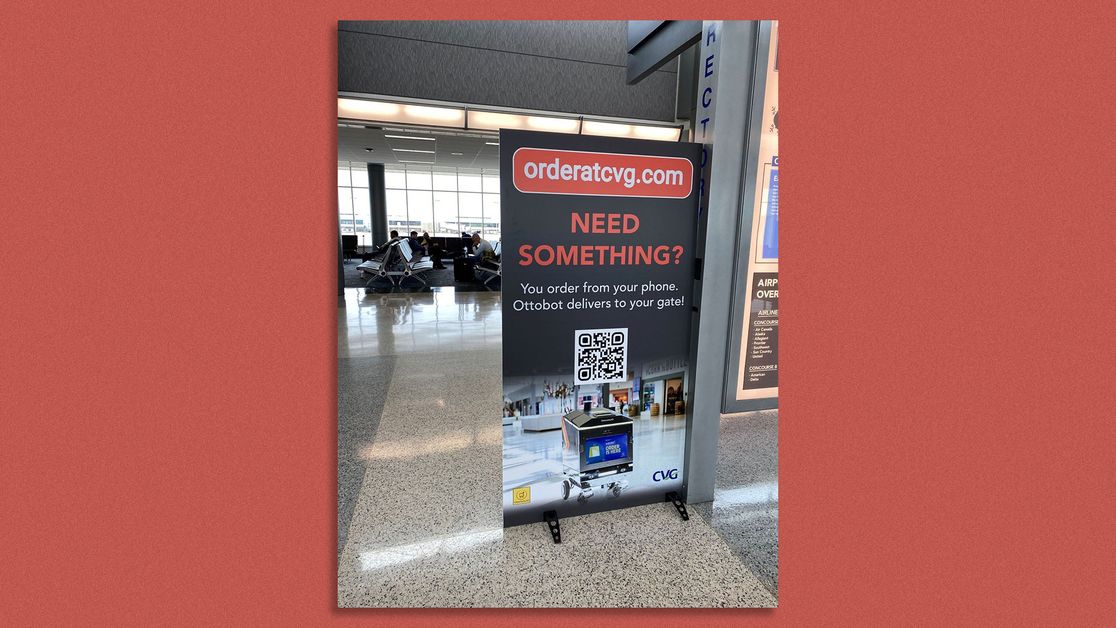| | | | | | | Presented By BigSpring | | | | Axios What's Next | | By Jennifer A. Kingson and Joann Muller · May 11, 2022 | | Talk about a dream assignment: Our own Joann Muller — who gets to test-drive a lot of cars — took a spin in the most anticipated model in years. Her take on Ford's new electric pickup truck is below. - Meanwhile, What's Next reader Caroline Brown answered our call for photos of working robots in the wild — and, as luck would have it, stumbled on a new type of deployment.
- Got something cool to call to our attention? Email whatsnext@axios.com.
Today's Smart Brevity count: 1,273 words ... 5 minutes. | | | | | | 1 big thing: A watershed moment for EVs, courtesy of Ford |  | | | Ford's F-150 Lightning's frunk stores gear in a secure, dry place. Photo courtesy of Ford | | | | Ford's F-150 Lightning — which is just hitting the market — is more than just another pickup truck: It's poised to open the floodgates for electric vehicle adoption in the U.S. by showing how much an EV can do, Joann writes. Why it matters: While Tesla started the EV revolution, Ford will likely get credit for taking these vehicles mainstream. Priced just under $40,000, the F-150 Lightning is a versatile and affordable gateway product that can (sometimes) be charged in under an hour. What's happening: Ford is overhauling its F-Series pickup truck — America's best-selling vehicle — by ripping out the engine and transmission and replacing it with an electric powertrain. - It's a bet-the-company move that, if all goes as planned, will attract buyers who never considered an EV — or a pickup — before.
So far, it looks like a success: Ford has taken nearly 200,000 reservations and already bumped up production capacity twice, hoping to hit an annual rate of 150,000 by next year. The big picture: Ford sells 900,000 gasoline-powered F-Series trucks per year, bringing in more than $40 million in annual revenue — more than companies like McDonald's, Nike and Coca-Cola. - There are 16.4 million of them in operation — 5.8% of all vehicles on the road.
Ford is not the first to deliver an electric truck; General Motors' GMC Hummer and Rivian's R1T beat them to market. But those are fun, expensive toys. - The Ford Lightning starting price is half of the Rivian and far less than the six-figure Hummer, putting it within reach for many.
Situational awareness: I flew to Texas, the truck capital of America, last week to be among the first to try the new electric F-150. - I drove from downtown San Antonio through suburban stop-and-go traffic, then north on I-10 to explore the rolling hills of central Texas and the Singing Water vineyards, where I went off-roading — pretty much every kind of driving scenario you can imagine.
The "mega power frunk" — or front trunk — could be the Lightning's biggest selling point: - All EVs have a front trunk where the engine is normally found, but Ford's is massive: It's got 14 cubic feet of space, with room for 400 pounds of cargo, plus a deep well with a drain that doubles as a cooler.
The bottom line: The Ford F-150 Lightning is the most anticipated vehicle in decades — and, so far at least, lives up to the hype. Joann tows an electric boat with an electric pickup truck. Photo: Bob Gritzinger Read more about her driving impressions. |     | | | | | | 2. Meanwhile, EV startups struggle |  | | | Illustration: Aïda Amer/Axios | | | | Startup electric vehicle makers are watching their stocks plunge as they grapple with the same market challenges that established automakers like Ford may be better positioned to handle, Nathan Bomey writes in Axios Closer. Why it matters: A bevy of startups like Rivian, Lucid, Faraday Future and Lordstown Motors, hoping to copy Tesla's success, have made bold promises about their production plans and financial prospects. But they're facing a torrent of bad news: Ford is reportedly selling 8 million shares of its Rivian stock, driving the startup's stock to new lows this week. - Meanwhile, Lordstown faces a crucial deadline in its attempt to sell its Ohio factory to iPhone maker Foxconn.
- Beleaguered startup Faraday Future's shares have lost more than half of their value over the last month.
- Another EV startup, Canoo, warned Tuesday it might not have enough cash to keep doing business.
The big picture: EV startups are dealing with all the same issues as established automakers: supply chain problems, materials inflation, intense competition and the stock market's intense volatility of late. - "My honest view is there are too many startups around, and not all of them will make it because at the end of the day it's a very hard job," Faraday Future CEO Carsten Breitfeld tells Axios.
Read the full story. |     | | | | | | 3. Rent my pool! |  | | | Illustration: Brendan Lynch/Axios | | | | Pool-sharing companies are betting that the market for opening up private homes to leisure activities extends beyond the pandemic, Asher Price writes for Axios Austin. How it works: There are two rival services — Swimmy and Swimply — and they operate like Airbnb for pools. Swimming pool owners rent out their backyard spaces for chunks of time, and the middleman companies get a cut. - "We see tremendous opportunity, given the high rate of middle-class pool ownership," Asher Weinberger, co-founder of Swimply, tells Axios.
- Swimply has big aspirations in Texas, he said: "You have the heat there — and nobody minds driving distances."
What they're saying: The pandemic came with a silver lining for Swimply, which had just gotten off the ground and is now gunning for a $1 billion valuation. "Demand went through the roof" as the pandemic got underway, Weinberger said. Yes, but: The ebbing of the pandemic means "you can make your kid's birthday now at Chuck E. Cheese again, instead of someone's pool," Weinberger acknowledged. Zoom out: Other pool-sharing companies — such as Swimmy — are also vying for guests and hosts. - There's competition from old-fashioned public pools.
What's next: Weinberger said the company wants to set up ways people can share their tennis courts, music studios, woodworking shops and gourmet kitchens. Read the full story. |     | | | | | | A message from BigSpring | | Measure proficiency with ease | | |  | | | | AXA is offering employees mobile-first, self-paced product training while monitoring impact and proficiency. Here's how: BigSpring allows AXA to share important product training and updates with financial consultants within a single, measurable channel. Learn more. | | | | | | 4. Face recognition settlement highlights lack of federal law |  | | | Illustration: Annelise Capossela/Axios | | | | A settlement between Clearview AI and civil rights groups restricts the company's sale of its facial recognition technology — while also spotlighting the lack of federal rules governing biometric information, Ina Fried writes in Axios Login. Why it matters: Facial recognition could offer huge benefits — everything from speeding commerce to solving crimes. But it also raises huge red flags over user privacy as well as the technology's record of bias, particularly against people of color. - Clearview has one of the largest databases of human faces, largely built by scraping photos from online sites, including Facebook, LinkedIn and Venmo.
- It sells its technology primarily as a subscription service to law enforcement agencies, though it also has broader commercial ambitions.
Driving the news: The deal settles an Illinois lawsuit brought in May 2020 on behalf of sexual assault and domestic violence survivors as well as sex workers and others vulnerable to having their images catalogued. - Under the terms, Clearview won't sell its full facial recognition database and algorithm to private companies for use in the U.S.
- The company will also stop selling access to its database of faces to any entity in Illinois, including state and local police, for five years.
Read the rest. |     | | | | | | 5. Robots as airport butlers |  | | | An Ottobot robot in the Cincinnati airport. Photo: Caroline Brown | | | | What's Next reader Caroline Brown spotted this robot and told us: "At CVG/Cincinnati airport, you can order snacks and drinks from your phone and have it delivered to you at your gate by Ottobot." - "I haven't seen this before," she said. "Granted, I was on my first business travel in 2 years last week, so maybe this became common while I was on travel hiatus."
Where it stands: Caroline hadn't missed anything — in fact, she spotted something new. A company called Ottonomy just recently deployed its fleet of delivery robots, which work both indoors and outdoors. - "Launching as a world first, a fleet of fully autonomous delivery robots have been dispatched at Cincinnati/Northern Kentucky International Airport," a publication called Airport Technology reports.
- "Named 'Ottobots,' the robots provide passengers with the ability to complete contactless orders for food and retail within the airport."
- The Ottobots are a COVID-era convenience meant to facilitate contactless delivery and help compensate for retail labor shortages.
A sign at the Cincinnati airport tells visitors how to use the Ottobot robots. Photo: Caroline Brown The big picture: Ottonomy calls its business model "RaaS" or Robotics as a Service. - It calls the Ottobots — which also deliver food for restaurants — "a quicker, safer, and more economical delivery option as compared to traditional 3rd party delivery services."
- "Above all, these robots are set to reduce carbon emissions and improve quality of life," Ottonomy says.
|     | | | | | | A message from BigSpring | | Emails aren't reliable | | |  | | | | AXA found that relying on email sends to get employees product and training updates resulted in low sales quotas, as emails often went unopened and had limited trackability. BigSpring improved proficiency by putting mobile-first, self-paced training and information within a single channel. | | | | Was this email forwarded to you? Get your daily dose of What's Next magic by signing up for our free newsletter here. |  | It's called Smart Brevity®. Over 200 orgs use it — in a tool called Axios HQ — to drive productivity with clearer workplace communications. | | | | | | Axios thanks our partners for supporting our newsletters. If you're interested in advertising, learn more here.
Sponsorship has no influence on editorial content. Axios, 3100 Clarendon Blvd, Suite 1300, Arlington VA 22201 | | | You received this email because you signed up for newsletters from Axios.
Change your preferences or unsubscribe here. | | | Was this email forwarded to you?
Sign up now to get Axios in your inbox. | | | | Follow Axios on social media:    | | | | | |











No comments:
Post a Comment